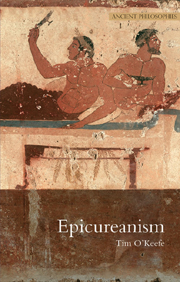Book contents
- Frontmatter
- Contents
- Preface
- Acknowledgements
- Sources and abbreviations
- Chronology
- 1 Introduction: the life of Epicurus and the history of Epicureanism
- I Metaphysics and physics: introduction and overview
- II Epistemology: introduction and overview
- III Ethics: introduction and overview
- 11 Pleasure, the highest good
- 12 Varieties of pleasure, varieties of desire
- 13 The virtues and philosophy
- 14 Justice
- 15 Friendship
- 16 The gods
- 17 Death
- Glossary of terms
- Notes
- Further reading
- Bibliography
- Index
15 - Friendship
from III - Ethics: introduction and overview
- Frontmatter
- Contents
- Preface
- Acknowledgements
- Sources and abbreviations
- Chronology
- 1 Introduction: the life of Epicurus and the history of Epicureanism
- I Metaphysics and physics: introduction and overview
- II Epistemology: introduction and overview
- III Ethics: introduction and overview
- 11 Pleasure, the highest good
- 12 Varieties of pleasure, varieties of desire
- 13 The virtues and philosophy
- 14 Justice
- 15 Friendship
- 16 The gods
- 17 Death
- Glossary of terms
- Notes
- Further reading
- Bibliography
- Index
Summary
Epicurus praises friendship in extravagant terms, calling it an “immortal good” (SV 78), which “dances round the world announcing to us all that we should wake to blessedness” (SV 52). This is because friendship is by far the greatest thing for making our whole life blessed (KD 27). Knowing that we can count on our friends to help us out in times of need allows us to face the future fearlessly. But in order to have such friends, we must in turn help our friends out when they need us. So the Epicureans believe they can accommodate friendship within their egoistic hedonism. In fact, they even claim that there is good prudential reason to love your friend as much as yourself. Egoistically loving your friend as much as yourself is a difficult trick to pull off, and it may seem that in the case of friendship, at least, Epicurus abandons his strict psychological egoism. This is probably not true. However, some later Epicureans did advance such non-egoistic theories, and while they are inconsistent with key tenets of Epicureanism, they are also, arguably, closer to the psychological phenomena of friendship.
The security of friendship
Just as courage comes to be by reasoning out what is advantageous, so too does friendship come to be because of its usefulness (DL X 120). The main reason given by Epicureans for the importance of friendship is that it provides safety: with friends to protect you, your life will be secure from danger, whereas the friendless life is beset with risks (Cic. Fin. I 65–66).
- Type
- Chapter
- Information
- Epicureanism , pp. 147 - 154Publisher: Acumen PublishingPrint publication year: 2009



